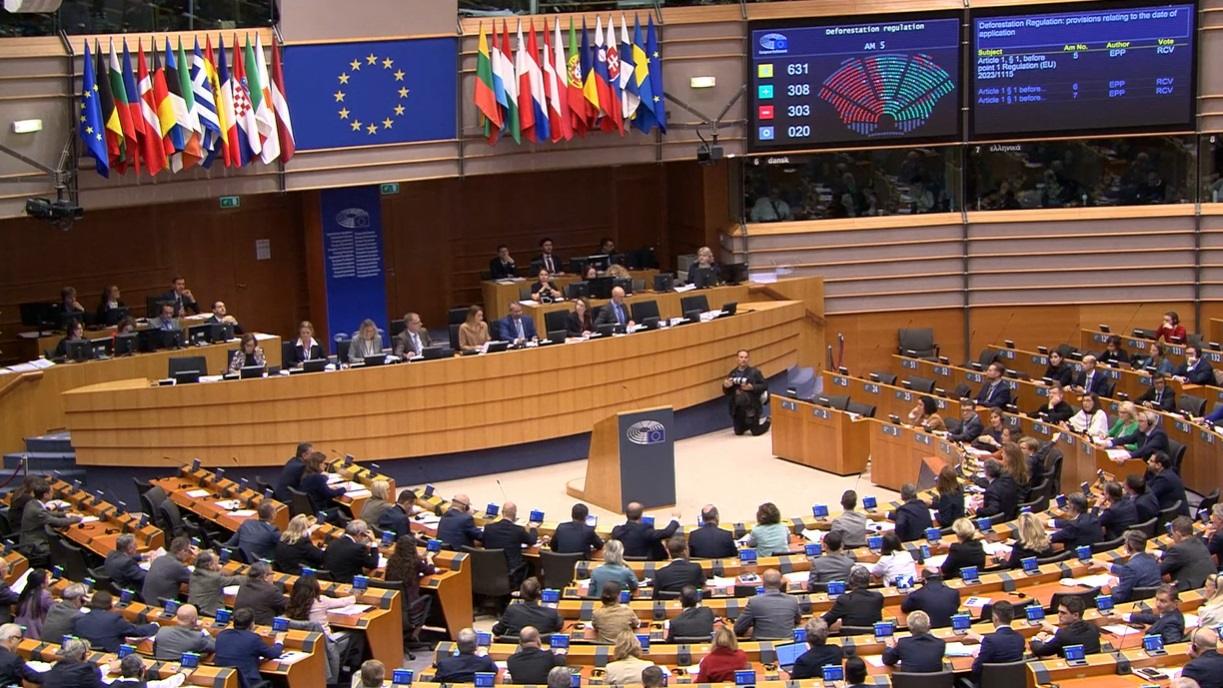
EU Lawmakers Agree to Delay, Ease Law Banning Deforestation-Linked Products

Lawmakers in the European Parliament voted 371 to 240 to a one-year delay and amendments to alter the EU Deforestation Regulation (EUDR), a new law aimed at ensuring that products imported to or exported from EU markets no longer contribute to deforestation and forest degradation globally, which was set to apply to from the end of this year, beginning with large companies.
While the MEP’s vote would see some changes in the new law, including the exemption of countries assessed as posing little deforestation risk from most of the EUDR requirements, several other proposed amendments aimed at significantly easing and extending the delay of the law were removed prior to the vote.
The EUDR was initially introduced by the EU Commission in November 2021, with proposals aimed at effectively banning deforestation-linked projects on the EU market, and establishing strong compliance requirements for companies providing or utilizing key commodities and products such as palm oil, beef, timber, coffee, cocoa, rubber and soy, in addition to some of their derived products, such as leather, chocolate, tires, or furniture.
Under the new rules, companies that want to place relevant products on the EU market, or export them, will face mandatory due diligence rules, including a requirement to trace the products back to the plot of land where it was produced, to prove that the products were produced on land that was not subject to deforestation after 2020, and are compliant with all relevant applicable laws in force in the country of production.
The regulation entered into effect in June 2023, giving companies 18 months to implement the rules, which would become applicable at the end of December 2024 for large companies, and June 2025 for micro- and small enterprises. In October, however, the Commission proposed a one-year delay to the new rules, noting that “several global partners have repeatedly expressed concerns about their state of preparedness,” and adding that even within the EU, “the state of preparations amongst stakeholders in Europe is also uneven.”
Prior to the vote, the European People’s Party (EPP), the largest party in Parliament, proposed a series of amendments to the law, which was described by EPP MEP Christine Schneider as a “bureaucratic monster,” that “risks hampering European farmers and businesses.” The EPP’s proposals included extending the delayed implementation to two years, creating a “no risk” category for countries with negligible deforestation risk which would face significantly less stringent requirements, and exempting traders from the regulation, such that only companies placing products on the market would be responsible for proving the products’ deforestation-free status.
While the extended delay and trader exemption were removed, MEPs voted to approve the creation of the “no risk” category, and to the one-year delay.
Notably, several European companies and business groups that would be significantly impacted by the new law have called for its immediate implementation in its current form, after investing and preparing for the EUDR, with statements of support issued by Mars, Danone, Michelin, Carrefour, and the Cocoa Coalition, which includes Nestlé, Ferrero, Mondelez, Mars, and Unilever, among others.
Environmental groups warned that the vote would weaken the EUDR, undermining a key piece of environmental legislation. In a statement following the vote, Anke Schulmeister-Oldenhove, Forests Policy Manager at WWF European Policy Office, said:
“With this law becoming one big loophole, we’re now calling on President Von der Leyen to put an end to this carnage and protect her Green Deal legacy by withdrawing her proposal to delay EUDR implementation. This is the only responsible course of action that will allow the EUDR to fulfill its purpose and protect the world’s forests from exploitation.”
Following the vote, the legislation will return to interinstitutional negotiations, with the final text required to be approved by the EU Council and Parliament before entering into force.